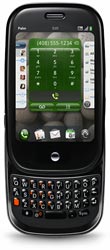 Palm has “politely” asked a website to block users discussing how to use its latest smartphone to provide internet access to a computer. It’s a sign of how cautious the firm is to avoid upsetting Sprint, with which it has an exclusive carrier deal.
Palm has “politely” asked a website to block users discussing how to use its latest smartphone to provide internet access to a computer. It’s a sign of how cautious the firm is to avoid upsetting Sprint, with which it has an exclusive carrier deal.
The Palm Pre launched earlier this week to generally strong reviews. It’s the first Palm device to run a Linux-based operating system, which inevitably made it much more likely users would try out unofficial tricks and tweaks.
One such use for the phone would be tethering. That’s where users adapt the phone so that it can effectively act as a mobile modem for a computer, usually a laptop. The primary advantage is that users can then get internet access for the computer anywhere they can get a phone signal, rather than having to be near a wireless access point. In some cases it can also mean cheaper internet access, or allow the user to overcome usage limits.
There’s no firm evidence at this stage that anyone has managed to use the Palm Pre for tethering. However, the issue had already come under discussion by users of Pre Dev Wiki, a site devoted to unofficial tweaks to the device. That’s come to a sharp end, with the site noting:
“We have been politely cautioned by Palm that any discussion of tethering during the Sprint exclusivity period (and perhaps beyond—we don’t know yet) will probably cause Sprint to complain to Palm, and if that happened then Palm would be forced to react against the people running the IRC channel and this wiki.”
The Sprint element is the important point. Palm themselves are probably not that concerned about people tethering the Pre – if anything, it’s a useful (unofficial) selling point. But they have an exclusive deal with Sprint to be the network carrier for the phone for a set period after launch (reported as six months).
The Sprint deal helps finance the phones being sold at a much lower price than would otherwise be possible (likely below cost price): Sprint gets new service customers, while Palm gets to sell more handsets. The problem comes when Sprint finds its network being clogged up by people running their laptops through the Palm, particularly considering they are more likely to use data-hungry features such as streaming video on a machine with a larger screen.
Apple has found itself in a similar situation, having to crack down on so-called ‘jailbreaking’ of iPhones to allow unauthorized uses such as tethering a laptop to an AT&T cellphone network connection.
